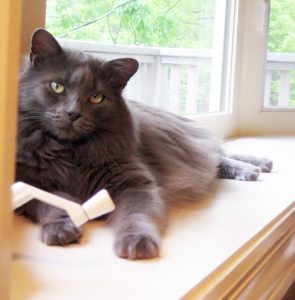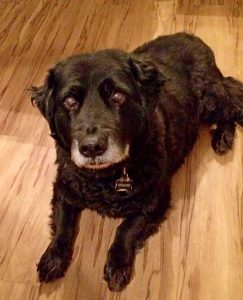Counselor helps people manage and recover from pet loss, grief
By Elise Zwicky For Chronicle Media — June 20, 2019
Liz Pollack, a Peoria counselor and life coach, specializes in helping people through the grief of losing a beloved pet. (Photo courtesy of Liz Pollack)
Liz Pollack will never forget the day a co-worker said “Bummer” when she shared that her 18-year-old beloved cat had died over the weekend.
“Not only was that not helpful, but it really hurt my feelings that someone I worked with and thought had understood really didn’t. It got me thinking about what support is out there for others going through this,” said Pollack.
With a master’s degree in counseling psychology, Pollack has worked as a counselor for more than 30 years and took online courses three years ago through the American Institute of Health Professionals to become a certified pet-loss grief recovery specialist.
Local veterinarians who tell clients about her services have told her they’re not aware of other counselors in the area who are similarly certified.
“I wanted to do it because I kept hearing about people who had lost their pets and were experiencing the same kind of grief that we do when we lose humans, but a lot of people would tell them, ‘Oh, it was just a dog’ or ‘It was just a cat,’ which would trivialize or minimize the significance of the loss,” Pollack said.
She estimates she’s helped about 100 clients through the grief of losing a pet or even the anticipation of losing a pet since becoming certified. She also counsels clients with other issues and is certified as a life coach and executive coach through her private practice, Leg Up Services.
People who are grieving the death of a pet experience the same stages of grief as people who have lost a human, with the biggest difference being the reaction of others to their grief, Pollack said.
“Plus with pets, very often they are part of that person’s daily routine in a way that maybe a human isn’t,” she added. “The pet is there morning, noon and night and is part of your routine. So when the pet is gone, the routine is also affected.”
Pollack is considering adding a pet-loss grief support group and possibly workshops that would share information on the stages of grief, give people an opportunity to talk about their pets and conclude with an art activity to honor the pets. She also is creating a pet-loss grief group on Facebook that will be open to the public.
Most clients come to Pollack’s Peoria office for counseling, but she also helps some who live outside the area via a confidential video platform. She doesn’t take insurance but tries instead to keep her rates affordable.
“I can start working with people before the pet has even passed away. Sometimes there is that decision of whether to euthanize a pet or not, and that’s huge,” Pollack said. “I can understand it because I’ve been through it, too. No one wants to do it too soon or wait too long.”
She also helps clients find ways to memorialize a pet. “Certainly, there’s scrapbooking or creating a memory book. I even know people who will do a bucket list with their pet if the pet is physically healthy enough to do that. It’s really about making memories,” she said.

After Sylvester, 11, was diagnosed this spring with advanced heart failure, his owner, Claire Evans, found herself obsessing with his illness and sought help from pet-loss grief recovery specialist Liz Pollack. (Photo courtesy of Claire Evans)
Some find it comforting to keep a pet’s favorite toy or other keepsake. “I still have the hair bows from the poodle we had when I was growing up. It’s just that idea that you still have something of theirs. I think that’s very comforting,” Pollack said.
A lifelong animal lover, Pollack had a variety of pets throughout her childhood and currently has two dogs and a cat. She also is president of the Peoria-based Pets for Seniors rescue organization.
Peorian Claire Evans, who also serves on the PFS board, recently sought help from Pollack after her family’s 11-year-old cat, Sylvester, was unexpectedly diagnosed with advanced heart failure.
“You have a well cat one day, and the next day, boom, he’s terminal,” Evans said. “Now he takes nine pills a day, but he doesn’t know he’s sick and he certainly doesn’t act at all sick.”
Evans and her husband also have a 4-year-old daughter and another cat. She went to see Pollack after she found herself obsessing over Sylvester’s diagnosis and how he might suffer in the end.
“I had what they call anticipatory grief. I was ruminating on it 24/7 and that was just not sustainable,” she said. “I got a whole bunch of ideas and an outside perspective from somebody who can really cut to the heart of what grief is and how do you cope with it.”
Evans said she would definitely recommend others get counseling if they are in a similar situation. “I think people are hesitant to seek out any extra help when it comes to matters of your thoughts, but they don’t realize they’re missing out on people whose life’s work is to help. They have a battery of things they can offer you as tools to work through it,” she said.
Another issue Pollack helps clients with is whether or not to adopt another animal after losing a pet. “I don’t believe it in any way minimizes the love you had for your previous pet. It just means you have more love to share. Others may not be ready for another pet for a long time. So everybody’s process is very different, and I tell people not to rush through it,” she said.

Wolfie is one of three pets that currently live with pet-loss grief recovery specialist Liz Pollack. The Peoria counselor has had cats, dogs, fish, birds, ducks, a snake and even a goat so far in her lifetime. (Photo courtesy of Liz Pollack)
She also noted that grief can resurface later, especially if the feelings aren’t addressed.
“What’s most rewarding to me is when people come to terms with the loss and reach that level of acceptance and stop blaming themselves for missing something. They get to that contentment and can sit back and just have the good memories,” she said.
For more information or to make an appointment with Liz Pollack, email her at lpollack@mtco.com or call her at 309-370-4492.






